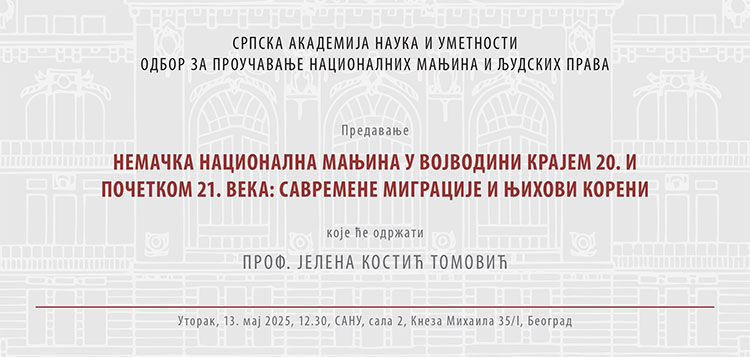Lecture ’German National Minority in Vojvodina in the Late 20th and Early 21st Centuries: Contemporary Migrations and Their Roots’
Professor Dr Jelena Kostić Tomović will give a lecture titled ’German National Minority in Vojvodina in the Late 20th and Early 21st Centuries: Contemporary Migrations and Their Roots’ on Tuesday, 13 May, at 12.30, at the SASA Hall 2.
Prior to the Second World War, approximately 500,000 members of the German national minority lived in the Kingdom of Yugoslavia, around 300,000 of whom resided in Vojvodina. A great majority of them were Danube Swabians, descendants of colonialists who came to Vojvodina and southern Austro-Hungaria in the late 17th, 18th and the first half of the 20th centuries.
Their numbers in the country already plummeted at the end of the war, falling between 200,000 and 250.000 members – a reduction of nearly two-thirds – to only 130,000. This downward trend continued after the liberation of Yugoslavia from the Nazis, mostly due to the impact of internment camps, forced labor in the USSR, and emigration.
Following the dismantling of these camps, around 40,000 Danube Swabians remained in Yugoslavia, with 30,000 of them being in Vojvodina.
In the following decades, many adopted a strategy of “national mimicry”, identifying as members of other ethnic groups, but more emigrated to the Socialist Republic of Germany and Austria in search of a better life.
According to the results of the 1981 Census, 4,625 Germans lived in Serbia, slightly more in 1991 (4,745), and significantly fewer in 2002 (3,901). Since then, their number has been declining even more noticeably: in 2022, out of 6,647,003 citizens of the Republic of Serbia, only 2,573 declared themselves as Germans. The largest number, as expected, was in Vojvodina – 1,985, 341 in Belgrade and 247 in other parts of the country. In addition, 144 citizens of the Republic of Serbia declared themselves as Austrians, a category that had not appeared in previous censuses.
The reasons for the significant decrease in the number of the German national minority in Vojvodina and in the Republic of Serbia in general should be verified through targeted and thorough research, but it can certainly be said that one of the causes is migration, or emigration, to German-speaking countries, primarily for economic reasons.

